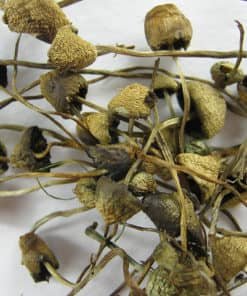Michelle Janikian // Dec. 2, 2019
Women have always played an integral role in psychedelic healing and research, even if they haven’t always been highlighted as mavericks in the field. But as the “Psychedelic Renaissance” goes mainstream, it’s time to start recognizing groundbreaking women in psychedelic science and activism. The five women we’ve chosen to feature are all actively changing the landscape of psychedelics, from developing leading theories in how they work, to advocating for fair access for all. These women, among many other women and gender non-conforming folk, are shifting the way society and science view these substances and bringing forth a new generation of doctors, researchers, and policymakers, with psychedelics at the core.
Ann Shulgin

Born in 1931, Ann Shulgin is often seen as a matriarch of the psychedelic movement. Before MDMA was classified as a Schedule I substance in 1985, and then 2C-B in 1995, Shulgin provided psychedelic-assisted therapy with these substances for many in the Bay Area using her expertise in Jungian psychology. She is the widow of the renowned chemist, Alexander “Sasha” Shulgin, who had a license from the DEA to essentially invent new psychedelic compounds and test them on himself, synthesizing over 230 new psychoactive compounds in the process, including 2C-B. Together, they co-wrote two classic psychedelic books,PIHKAL: A Chemical Love Story and TIHKAL: The Continuation, detailing those substances, including their own rating scale to judge the personal effects. Ann Shulgin is also the Founder of Transform Press, has contributed to many other books and publications on the subject, including Ecstasy: The Complete Guide andThe Secret Chief Revealed, and continues to write and speak on psychedelic issues.
Monnica Williams

Monnica Williams, Ph.D., is a clinical psychologist, researcher and professor who’s dedicated to expanding psychedelic-assisted therapy access to minorities and people of color (POC). She’s a trained MDMA-assisted therapist and has worked on Multidisciplinary Association for Psychedelic Studies (MAPS) PTSD trials, including the only site exclusively available to POC. As an expert in race-based trauma, Williams is working with MAPS on making MDMA-assisted therapy more inviting and inclusive to marginalized communities by training more therapists of color and tweaking certain aspects of the protocol, like the language and music used. Williams is also the Clinical Director of the Behavioral Wellness Clinic in Connecticut as well as the Associate Director of the Chacruna Institute for Psychedelic Plant Medicines, a publication and organization that bridges the divide between sacred entheogenic traditions and current psychedelic science. To bring light to racial disparities and cultural differences in treating anxiety disorders, Williams has authored over 100 peer-reviewed papers as well as articles and book chapters in her field.
How to Grow Mushrooms 101 – DoubleBlind Online Course
Learn how to grow mushrooms at-home through our online course complete with 7 video episodes, a mushroom legality guide, support from the DoubleBlind mycology experts, and more!
How To Grow Mushrooms Course Now On Sale! Let’s Grow.
Buy Now
Rosalind “Ros” Watts

Rosalind Watts, Ph.D. is the clinical lead of groundbreaking trials on psilocybin for depression at Imperial College London. Through her experience guiding many psilocybin-assisted therapy sessions in her work at Imperial, she has written several key scientific papers on the subjective psilocybin experience and psychological mechanisms of post-trip changes. Themes she explores in her work, like psilocybin’s ability to connect people with themselves, others, and the world, and to help people move from “avoidance to acceptance” of difficult emotions, is shaping how the psychedelic and scientific communities explain how mushrooms work for relieving mental health conditions. Based on this work, Watts has recently developed the ACE Model (Accept, Connect, Embody) to provide psychedelic therapists with a framework on how to work with a depressed population.
Bia Labate

Bia Labate, Ph.D., is an anthropologist from Brazil with a focus on psychoactive substances, drug policies, shamanism, and religion. She is involved in the psychedelic movement as the Executive Director of Chacruna, and organizes and speaks at many events in the community. Labate is also the Public Education and Culture Specialist at MAPS, adjunct professor at the California Institute of Integral Studies (CIIS), visiting professor at the University of Guadalajara, Mexico, and author of over 20 books and several peer-reviewed papers. She is a huge proponent of including more diverse voices in the psychedelic community, especially of queer, women/non-binary, Latinx, and indigenous folks in these important and societal-shifting conversations.
Natalie Ginsberg

Natalie Lyla Ginsberg, M.S.W., is the Director of Policy and Advocacy at MAPSwhere she lobbies in support of cannabis and psychedelic research and policy change. She is dedicated to building and organizing the psychedelic community as well as pushing these issues to the front of social change. Ginsberg originally got involved in advocacy work after her experience as a social worker in low-income neighborhoods in New York City where she became frustrated with systemic failures making it impossible for her clients to succeed. Before joining MAPS in 2014, she worked as a policy fellow with the Drug Policy Alliance and helped to bring medical cannabis to New York state in an attempt to end racist marijuana arrests. Now, in coordination with MAPS and Imperial College London, she is co-developing a psychedelic peace-building strategy between Israelis and Palestinians, inspired by the potential of these substances to heal systemic, intergenerational trauma and build community.
Michelle Janikian is a journalist focused on drug policy, trends and education. She’s the author of the upcoming book, “Your Psilocybin Mushroom Companion: An Informative, Easy-to-Use Guide to Understanding Magic Mushrooms”, writes a column for Playboy about psychedelics and cannabis and has also contributed to High Times, Herb, Rolling Stone and Teen Vogue.

